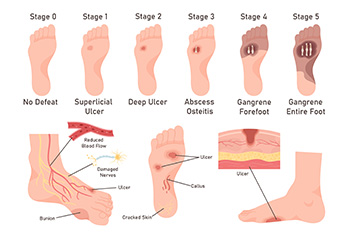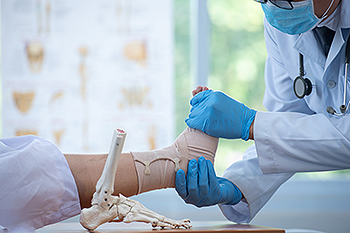Connect With Us
Blog
Items filtered by date: September 2024
Gout Pain Can Be Managed
Diabetic Foot Ulcers Cause Foot Pain

A diabetic foot ulcer is a serious complication of diabetes, characterized by a sore or wound on the foot that is slow to heal. These ulcers often develop due to poor blood circulation and nerve damage, common in diabetic patients. Risk factors include uncontrolled blood sugar levels, peripheral artery disease, and neuropathy, which diminishes sensation in the feet making injuries less noticeable. The progression of a diabetic foot ulcer typically begins with minor wounds or blisters that fail to heal properly. Over time, these can deepen and become infected, leading to more severe complications if not treated promptly. If you have developed a foot ulcer, whether or not it is related to diabetes, it is suggested that you are under the care of a podiatrist who can effectively treat this condition.
Foot Pain
Foot pain can be extremely painful and debilitating. If you have a foot pain, consult with Deann Hofer Ogilvie, DPM from Ascend Foot & Ankle Center. Our practitioner will assess your condition and provide you with quality foot and ankle treatment.
Causes
Foot pain is a very broad condition that could be caused by one or more ailments. The most common include:
- Bunions
- Hammertoes
- Plantar Fasciitis
- Bone Spurs
- Corns
- Tarsal Tunnel Syndrome
- Ingrown Toenails
- Arthritis (such as Gout, Rheumatoid, and Osteoarthritis)
- Flat Feet
- Injury (from stress fractures, broken toe, foot, ankle, Achilles tendon ruptures, and sprains)
- And more
Diagnosis
To figure out the cause of foot pain, podiatrists utilize several different methods. This can range from simple visual inspections and sensation tests to X-rays and MRI scans. Prior medical history, family medical history, and any recent physical traumatic events will all be taken into consideration for a proper diagnosis.
Treatment
Treatment depends upon the cause of the foot pain. Whether it is resting, staying off the foot, or having surgery; podiatrists have a number of treatment options available for foot pain.
If you have any questions, please feel free to contact our office located in Lafayette, CO . We offer the newest diagnostic and treatment technologies for all your foot care needs.
Facts About Ankle Fractures

Ankle fractures occur when one or more of the bones in the ankle are broken, typically involving the tibia, fibula, and talus. The tibia and fibula are the main weight-bearing bones of the lower leg, while the talus sits between them and the heel bone, forming the ankle joint. Causes of broken ankles include trauma from falls, sports injuries, or accidents, as well as severe twisting or rolling of the ankle. Symptoms include sharp pain, significant swelling, bruising, and difficulty in bearing weight. The ankle may appear deformed or misaligned. Prompt medical evaluation is essential for proper diagnosis and treatment, which may involve immobilization, casting, or surgery depending on the severity of the fracture. If you have sustained an ankle fracture, it is suggested that you consult a podiatrist.
Broken ankles need immediate treatment. If you are seeking treatment, contact Deann Hofer Ogilvie, DPM from Ascend Foot & Ankle Center. Our practitioner can provide the care you need to keep you pain-free and on your feet.
Broken Ankles
A broken ankle is experienced when a person fractures their tibia or fibula in the lower leg and ankle area. Both of these bones are attached at the bottom of the leg and combine to form what we know to be our ankle.
When a physician is referring to a break of the ankle, he or she is usually referring to a break in the area where the tibia and fibula are joined to create our ankle joint. Ankles are more prone to fractures because the ankle is an area that suffers a lot of pressure and stress. There are some obvious signs when a person experiences a fractured ankle, and the following symptoms may be present.
Symptoms of a Fractured Ankle
- Excessive pain when the area is touched or when any pressure is placed on the ankle
- Swelling around the area
- Bruising of the area
- Area appears to be deformed
If you suspect an ankle fracture, it is recommended to seek treatment as soon as possible. The sooner you have your podiatrist diagnose the fracture, the quicker you’ll be on the way towards recovery.
If you have any questions, please feel free to contact our office located in Lafayette, CO . We offer the newest diagnostic and treatment technologies for all your foot care needs.
The Importance of Diabetic Foot Exams

A foot exam is important for preventing complications and maintaining foot health in individuals with diabetes. During the exam, a podiatrist will assess various factors to ensure early detection of potential issues. Key areas of focus include checking for any cuts, sores, or infections, as well as examining the condition of the skin for dryness, cracks, or fungal infections. They will also evaluate circulation by checking pulse levels in the feet and legs, and test sensation using a monofilament or tuning fork to detect any loss of feeling. Symptoms like persistent pain, swelling, or changes in skin color can indicate underlying problems that require attention. The exam may also include a review of footwear to ensure it provides adequate support and minimizes pressure points. To keep your feet healthy and address any concerns promptly, it’s suggested you make an appointment with a podiatrist for a comprehensive diabetic foot exam.
Diabetic foot care is important in preventing foot ailments such as ulcers. If you are suffering from diabetes or have any other concerns about your feet, contact Deann Hofer Ogilvie, DPM from Ascend Foot & Ankle Center. Our practitioner can provide the care you need to keep you pain-free and on your feet.
Diabetic Foot Care
Diabetes affects millions of people every year. The condition can damage blood vessels in many parts of the body, especially the feet. Because of this, taking care of your feet is essential if you have diabetes, and having a podiatrist help monitor your foot health is highly recommended.
The Importance of Caring for Your Feet
- Routinely inspect your feet for bruises or sores.
- Wear socks that fit your feet comfortably.
- Wear comfortable shoes that provide adequate support.
Patients with diabetes should have their doctor monitor their blood levels, as blood sugar levels play such a huge role in diabetic care. Monitoring these levels on a regular basis is highly advised.
It is always best to inform your healthcare professional of any concerns you may have regarding your feet, especially for diabetic patients. Early treatment and routine foot examinations are keys to maintaining proper health, especially because severe complications can arise if proper treatment is not applied.
If you have any questions please feel free to contact our office located in Lafayette, CO . We offer the newest diagnostic and treatment technologies for all your foot and ankle needs.
Broken Foot Symptoms

A broken foot, or foot fracture, occurs when one or more bones in the foot crack or break, often due to trauma such as a fall, sports injury, or accident. In addition to severe pain, symptoms of a broken foot typically include significant swelling and bruising around the injured area. You may have difficulty bearing weight on the foot and notice an abnormal shape or deformity. Tenderness in the affected area is common, and there may be a limited range of motion in the foot or toes. Numbness or tingling sensations can also occur, which may indicate nerve involvement. Difficulty walking or bearing weight on the foot, even when attempting to limp, is another sign. If you experience these symptoms, seeking medical evaluation is key to assessing the extent of the injury and determining appropriate care. If you suspect you have a broken foot or need guidance on treatment and rehabilitation, it’s suggested that you make an appointment with a podiatrist for specialized care to ensure the best possible outcome for your injury.
A broken foot requires immediate medical attention and treatment. If you need your feet checked, contact Deann Hofer Ogilvie, DPM from Ascend Foot & Ankle Center. Our practitioner can provide the care you need to keep you pain-free and on your feet.
Broken Foot Causes, Symptoms, and Treatment
A broken foot is caused by one of the bones in the foot typically breaking when bended, crushed, or stretched beyond its natural capabilities. Usually the location of the fracture indicates how the break occurred, whether it was through an object, fall, or any other type of injury.
Common Symptoms of Broken Feet:
- Bruising
- Pain
- Redness
- Swelling
- Blue in color
- Numbness
- Cold
- Misshapen
- Cuts
- Deformities
Those that suspect they have a broken foot shoot seek urgent medical attention where a medical professional could diagnose the severity.
Treatment for broken bones varies depending on the cause, severity and location. Some will require the use of splints, casts or crutches while others could even involve surgery to repair the broken bones. Personal care includes the use of ice and keeping the foot stabilized and elevated.
If you have any questions please feel free to contact our office located in Lafayette, CO . We offer the newest diagnostic and treatment technologies for all your foot and ankle needs.


 English
English Español
Español